|
|
|
Sort Order |
|
|
|
Items / Page
|
|
|
|
|
|
|
| Srl | Item |
| 1 |
ID:
172344
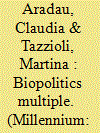

|
|
|
|
|
| Summary/Abstract |
This article proposes ‘biopolitics multiple’ as an approach to the heterogeneity of biopolitical technologies deployed to govern migration today. Building on work that has started to develop analytical vocabularies to diagnose biopolitical technologies that work neither by fostering life nor by making people die in a necropolitical sense, it conceptualises ‘extraction’ and ‘subtraction’ as two such technologies that take ‘hold’ of migrants’ lives today. Extraction, explored in the article through a focus on borderzones in Greece, captures the imbrication of biopolitics and value through the ‘outside’ creation of the economic conditions of data circulation. Subtraction, which is analysed in this article through a focus on Calais, captures the practices of (partial) non-governing by taking material and legal terrain away from migrants and reconfiguring convoluted geographies of (forced) hyper-mobility. This move allows us to understand the governmentality of migration beyond binary oppositions such as ‘making live/letting die’, biopolitics/necropolitics and inclusion/exclusion.
|
|
|
|
|
|
|
|
|
|
|
|
|
|
|
|
| 2 |
ID:
187026
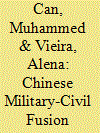

|
|
|
|
|
| Summary/Abstract |
An analysis of the Chinese military-civil fusion strategy through a neoclassical realist and state action theory perspective highlights that the advent of emerging technologies has opened up an unprecedented opportunity for states to amplify the extraction and mobilisation of resources, conducive to maintaining and increasing their military and economic power in global politics. Underpinned by increasing cooperation between the People’s Liberation Army and private companies as well as state-owned enterprises, the Chinese military-civil fusion strategy can be viewed as a comprehensive strategy of mobilisation and extraction (actively relying on state-driven technology advancement) that has especially drawn upon technology transfer and talent recruitment from abroad. In this regard, China has acted in line with the premises of state action theory.
|
|
|
|
|
|
|
|
|
|
|
|
|
|
|
|
| 3 |
ID:
174721
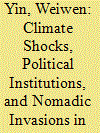

|
|
|
|
|
| Summary/Abstract |
While a large literature argues negative climate shocks can trigger conflicts, recent findings suggest moderate climatic conditions lead to war. This article proposes a conditional theory by incorporating political institution as a moderating variable. I argue that, under the impact of negative climate shocks, centralized societies can mobilize more resources for war, compared to decentralized societies. Thus, the former is more likely to resort to well-organized plundering to address the scarcity problem caused by detrimental climate shocks. Besides, centralized societies have little incentive to plunder when the climatic conditions are moderate, as they can collect taxes regularly through centralized institutions. A comparison between the more centralized Manchurian and the less centralized Mongols on their conflictual behavior serves as an empirical test. I find that temperature was negatively associated with the probability of Manchurian invasion after they embraced centralization but had a positive effect on the likelihood of Mongol invasion.
|
|
|
|
|
|
|
|
|
|
|
|
|
|
|
|
| 4 |
ID:
184140
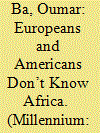

|
|
|
|
|
| Summary/Abstract |
Bombing begets pedagogy’, Naeem Inayatullah writes, reflecting on the sudden American thirst for knowledge on the Afghan people and its cultural landscape, soon after the US started its 2001 bombing campaign.2 The African predicament too, is a fertile ground for exploration, study, translation, and explanation. But above all, it is a site for life stories waiting to be tapped, taped, filled into survey questionnaires, and ran through regression tables. The aftermath of mass atrocities or deadly elections, an influx of Chinese loans, and military coups against inept satraps3 all provide ample opportunities for Europe and American scholars to flock into the continent.
|
|
|
|
|
|
|
|
|
|
|
|
|
|
|
|
| 5 |
ID:
189349
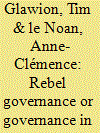

|
|
|
|
|
| Summary/Abstract |
Rebel governance assumes a symbiotic relationship between coercion and public goods provision. However, in the rebel-held town of Ndélé, Central African Republic, we find that governance happens in rebel-held territory, but rarely by rebels. Rebels allowed other actors to provide services for the people only when this did not hinder rebels extracting political clout and economic benefit from the people and their lands. We show how rebels’ extractive ambitions and governance discourses evolved during successive stages of rebellion through a diachronic comparison rooted in multimethod fieldwork from 2018 to 2022. We ask, why were rebel groups able to set up their rule, then rule for seven years, before ultimately losing power? Rebels evoked public goods at the onset of rebellion to justify the use of coercive means. After rebel rule was established, rebels outsourced public goods to international and state actors allowing for governance in rebel-held territory while focussing their own efforts on extraction. When their rule was challenged, rebels targeted governance actors and spaces in their territory in pursuit of economic gain and political dominance. Our findings call for a re-evaluation of existing rebel governance studies and the ways in which rebel groups are engaged with.
|
|
|
|
|
|
|
|
|
|
|
|
|
|
|
|
| 6 |
ID:
188577
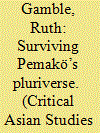

|
|
|
|
|
| Summary/Abstract |
This article traces a multi-generation history of Kunga Tsomo’s family, from the early 1900s when her grandmother migrated to Pemakö in the eastern Himalaya until the twenty-first century. Grandmother’s journey to Pemakö was part of a larger Vajrayana Buddhist migration to “hidden lands” in the southern Himalaya. This movement is most often framed as a religious event, but also involved the dispossession of Indigenous peoples, including the Adi of southern Pemakö. After coming to a negotiated settlement over land, the newly arrived Vajrayana Buddhists and Adi lived in neighboring villages within different ontologies. But soon after this settlement, a series of external states and institutions colonized Pemakö. The British and Qing Empires sent military expeditions in the 1910s. In the 1930s, the Tibetans annexed the territory. In the 1950s, it was bifurcated by the Sino-Indian border dispute. In the twenty-first century, it has become a site of a contest between international conservation campaigns and Chinese and Indian hydropower extraction. Despite the transformative effects of these external powers, this is not a story of cultural erasure. The article shows how the family’s commitment to Pemakö, its land and its multiple cultures has helped them survive and thrive.
|
|
|
|
|
|
|
|
|
|
|
|
|
|
|
|
| 7 |
ID:
186307
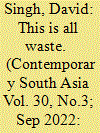

|
|
|
|
|
| Summary/Abstract |
Renewables are imagined in India around features of ‘greenness’ and ‘cleanness’ and are presented as the modern pathway towards sustainable development and unlimited growth. But this shining story entails problematic land politics and the related (un)making of space for capital accumulation: previous property regimes and land uses are erased while a new set of land technologies and territorial rules legitimates land dispossession and the private takeover of commons. Wind infrastructures are specifically targeting (common) lands categorized as ‘deserted’, ‘empty’ and ‘waste’, and subaltern groups (tribal, pastoral and Dalit communities) whose livelihood practices have been historically described as ‘unproductive’ and ‘backward’. These both violent and discursive logics of (neo)colonial and green energy land politics are mediated and fixed to the ground levels by powerful (land) brokers, contractors, wind companies’ land teams and political mediators who embark land on its tortuous, bureaucratic and yet material journey towards clearing, cleaning and holding value. This article offers perspectives from political geography and critical agrarian studies to understand the territorial process, the persistence of class-caste relations and the legacy of coloniality underlying the land politics of green energy development in borderland India.
|
|
|
|
|
|
|
|
|
|
|
|
|
|
|
|
| 8 |
ID:
152785
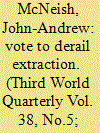

|
|
|
|
|
| Summary/Abstract |
In July 2013, a consulta popular (referendum) was organised by municipal authorities in Tolima, Colombia, to judge public opinion on the establishment of activities by an international mining conglomerate ie the Colosa (the Giant) gold mine. In this article study is made of the referendum, and emphasis given to its linkages with wider regional, national and Latin American efforts to anticipate damage and derail projects for resource extraction. Recognising the techniques and networks, and similar expressions of identity and territoriality, expressed in other campaigns against extraction, resource sovereignty is suggested as an approach to interpret the motivations for and dynamics of recent popular consultations.
|
|
|
|
|
|
|
|
|
|
|
|
|
|
|
|
|
|
|
|
|